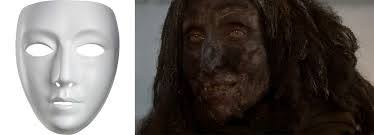“Man, like the other animals, is originally simply the puppet of instinct, just as the infant is. Unless he is moved by instinct, he remains passive, even asleep. When instinct is aroused he reacts precipitately, with a characteristic all-or-none type of reaction. He is aware, it is true, of what he does and of what happens around him. But he has no self-awareness: psychic images flit past in his consciousness, leaving little or no trace, no residue as it were, much as a moving picture flits over the screen. As long as the picture is being thrown upon the screen, it dominates the space; when the light goes out the picture disappears from the screen and leaves no trace upon it. Such is man’s consciousness before the ego develops.” ~M. Esther Harding, Psychic Energy, p. 209.
Dr. M. Esther Harding was one of Dr. Jung’s most accomplished and articulate followers. Trained at the London School of Medicine for Women and the University of London, she worked with him in Zurich before beginning her analytical practice in 1923 New York. Her classic book, Psychic Energy: Its Source and Its Transformation, is still an influential source for students of Jungian Psychology. Written during, and inspired by World War II, its purpose was to explore “what savage impulses, what ruthless monsters of the deep” lie beneath the cultured mask of consciousness, awaiting “a chance to seize the mastery and despoil the world!” ~Harding, p. ix.
As she explained,
“Until the first appearance of the works of Dr. C.G. Jung, the unconscious was regarded as merely the repository of forgotten or repressed experiences. In this there could be no answer to the problem of a world in the grip of a barbaric regression. But Dr. Jung discovered and opened to all explorers another aspect of the unconscious….and found there the sources of psychological life that produce not only atavistic [ancestral] forms but also the potentialities for new development.” (p. ix,x).
During a three year period beginning in 1913, Jung experienced an intrusion of the “savage impulses” and “ruthless monsters” of the unconscious that shook him to the core and turned his world upside down. As a practicing psychiatrist, he had a rough idea of what was happening to him, but instead of medicating himself to control his impulses and dull his pain as was the custom, he took a revolutionary approach. He decided to allow the monsters to have their say, to heed the messages they brought him in dreams and fantasies, and to interact with them by way of active imagination. The techniques and theories he developed, along with his transformation and healing, informed his work for the rest of his life and led to this important insight:
“Every civilized human being, whatever his conscious development, is still an archaic man at the deeper levels of his psyche.”~C.G. Jung, Modern Man in Search of a Soul, p. 128.
This archaic being dwells within each of us in the form of archetypes and animal instincts. The source of all our psychological energy, this being is not inherently evil any more than animals are. It is simply the natural expression of our psychic energy as focused solely on ourselves during our earliest phase of consciousness. As I noted in my previous post, I call this Epoch I: Physical Consciousness.
 With family guidance and conditioning from societal institutions—education, religion, business, and government—this energy is gradually brought under a measure of control so that the child begins to create a mask, or persona, of acceptable attitudes and behaviors. If the persona remains unchallenged by inner (psychological) or outer (societal) forces, the child can, and often does, grow up to live out his or her life without evolving into more mature phases of consciousness. As Harding explained,
With family guidance and conditioning from societal institutions—education, religion, business, and government—this energy is gradually brought under a measure of control so that the child begins to create a mask, or persona, of acceptable attitudes and behaviors. If the persona remains unchallenged by inner (psychological) or outer (societal) forces, the child can, and often does, grow up to live out his or her life without evolving into more mature phases of consciousness. As Harding explained,
“A person whose consciousness has not grown beyond the state of the autos [Epoch I] can nevertheless undergo a process of development and refinement. The focus of his interest may shift from the more grossly physical to the aesthetic, and he may acquire all the subtleties of cultured appreciation; nevertheless, if his consciousness is oriented to the effects on himself only, he is still in the auto-erotic stage of development….
“Such a person will give the impression of being an egotist, but his egotism is not the result of a conscious determination to have his own way, of a will to power; rather it is due to his complete ignorance and unawareness of any aspect of the situation except such as effect him, or those with whom he is identified. Such a person does not realize that he is dominating his environment or demanding more than his share, and he would be amazed if he were to be made aware of the true nature of his attitude.” p. 208-9.
We all know people like this; we see them on the news every day. And if we magnify this situation from the individual to the collective, we see global implications in this observation from Harding:
“Up to the time of the rise of modern materialistic thought…the hypothesis that rational thinking could solve all the problems of the world was very widely accepted. But there remained the irrationality of man himself. If only man would act rationally, perhaps wars and depressions and insanity could be avoided; but unfortunately man does not seem to be any more capable of acting sanely now than he was a thousand years ago. We are still confronted with man’s own irrational behavior and the untamed forces within his psyche.” Harding, pp. 202-3.
Call me a dreamer, but can you imagine a future when Enhancing Self-Knowledge is a key plank in the platform of a presidential candidate? When the Department of Defense’s main priority is to defend us against the untamed forces within the psyche? America has been at the forefront of many of the world’s great advances; why not lead in promoting consciousness, the most valuable and life-enhancing advance of all?
Image Credits: Thanks to Lewis Lafontaine for the Jungian images.
Jean’s newest book, Healing the Sacred Divide, can be found at Amazon and Larson Publications, Inc. Ebook versions of The Bridge to Wholeness and Dream Theatres of the Soul are also at Amazon as well as Kobo, Barnes And Noble, and Smashwords.






0 Responses
In the last paragraph you say, “call me a dreamer.” I will and stand by you in that dream hoping to make it a reality.
Thanks Cindy. I do think something like that could happen one day, but not in our lifetime. The country of Bhutan has formally declared that one of its goals is to study and pursue “Gross National Happiness.” Isn’t that cool?
Reblogged this on lampmagician.
Thank your for your unflagging support of my blog, lampmagician. You are a comfort.
This is quite interesting. I think of ‘today’ and the vast resources being poured into destruction, mind control, surveillance, etc…by our psychopathic ‘overlords’ and in light of being a ‘dreamer’ wonder about the past… considering such knowledge of the psyche in a historical context. Do you think it’s possible, that at one point, perhaps eons ago, there was such a knowledge, a lore of symbols representing all of the unknown in the psyche. I’m wondering if we have lost what once was.
An interesting question, Steven. I would say that yes, we have definitely lost what once was, which would be a deep respect for, and understanding of, the symbolic, metaphoric language of the psyche. I’ve read several takes on this topic, and can only share what I’ve heard from others more knowledgeable than me on this subject.
Of course, the use of symbolism was prevalent in pre-history, i.e. cave art, hunting rituals, ancient monuments like Stonehenge and burial mounds like Newgrange, etc., storytelling, myths, etc., and everyone would have understood them and what they meant for their lives.
Likewise, the Jewish Torah, and Christian Old Testaments were written with a symbolic language that some people can only read literally today. And the symbolism in dreams was taken very seriously indeed in those days. This language would have been understood to be the same as the language of storytelling and myth, which use symbols and images to convey a wealth of meaning that makes words look sadly lacking in comparison. There was a symbolic language for flowers, herbs, and all plants, trees, and so on. And all of these things had meaning that corresponded to the life of the psyche.
The spread of the patriarchal sky god did much to eliminate our dependence on these symbols and images (Thou shalt not make graven images), and by the time of Plato, people were already beginning to see Logos (left-brained logic and reason) as a much “higher” and advanced form of thinking than what Plato called “mimesis” and what others call “mythos,” the right-brained language of symbols, imagination, metaphor, personal meaning, etc. Aristotle popularized that idea in mainstream Western culture and since that time, the “lore of symbols” has been eroded until very little of it remains.
Freud and Jung did much to reawaken interest in dreams and symbols and this has been a huge help. My dissertation dealt with some aspects of the symbolism in popular television shows watched by children, and others are now studying and teaching visual literacy with an emphasis on understanding symbolic meaning.
And then, of course, you artists have always kept the flame alive in your thinking and imagination and art, for which the rest of the world should be extremely grateful. Artists, in fact, are the primary carriers of the symbols arising from the psyche in any given era, and as such their work is in many ways prophetic and should be accorded the highest respect. But try to tell that to the education system, which is still obsessing over tests that measure only half the brain’s cognitive capacity.
As you can see, you’ve touched on a topic that is dear to me! I’m not sure I’ve fully answered your question, but thanks for giving me a chance to express some of what I feel about it. Jung and Neumann have written much on this topic, but I’m not well-enough versed in it to go deeply into it here without doing some research.
Wow. Thanks very much for this reply. I will appreciate and contemplate this.
Hi Jean,
Synchronicity is at work again. I have been mulling these things also recently. Sometimes it seems like a hopeless world situation, but I reach some grain of hope in reading Jung’s comments: “If only a world-wide consciousness could arise that all division and all fission are due to the splitting of the opposites in the psyche, then we should know where to begin…What does lie within our reach is the change in individuals who have, or create for themselves, an opportunity to influence others of like mind…anyone who has insight into his own actions, and thus has found access to the unconscious, involuntarily exercises an influence on his environment” (“The Mysterium Lectures”, Edward F. Edinger, p325).
This influence is taking place in your blog every week and I want to thank you personally for the most recent example: “Mysterium Coniunctionis”” was mentioned in your blog recently and gave me an impulse to re-read Edinger’s “The Mysterium Lectures”, an inspired interpretation of Jung’s masterpiece. I received a whole new perspective this time from my previous reading of it six years ago and it has opened some new passageways that were waiting for the light. Thank you again for your inspiration.
Richard
Oh, Richard. I’ve never read this quote before. (I have the lectures in my Collected works but haven’t gotten to them yet!) I’m so glad you found food for more reflection and self-awareness in one of my posts. It is deeply rewarding to be considered as one who influences the environment and others of like mind in the realm of self-discovery and consciousness. This is very high praise, indeed. Thank you.
Wonderful! You are not a dreamer.
So glad not to be alone! 🙂
Reblogged this on Fran Kramer and commented:
This is why dreamwork and meditation are so important.
Thanks for reblogging this, Fran.
Thank you Jeanie, this is very profound. The narcissist is so unaware of his affect upon another or the world. If we each got in touch with our shadow a little bit, this would also have an affect on the outer world – tiny ripples but necessary. Jung’s and Esther Harding’s quotes are so apt here.
And yes, a noble ideal – to promote the raising of consciousness world-wide, which you are in your significant way, doing. So much wounding to be healed – do you think countries are capable of confronting their shadow/s? Here in my country our politicians are in a state of denial – the hardest nut to crack …
Thank you for reminding me of the word, ‘narcissist,’ Susan. Yes, it’s another way of thinking about adults, especially those whose behavior is noticeably dysfunctional, who are still living in the early stages of consciousness, whose most pressing need is self-satisfaction. Few, if any of us are totally selfless,of course. We all probably know someone who wears a persona of selflessness but somehow always manages to get their way. Not even they realize they’re manipulating situations and the emotions of others to their advantage. I’m thinking about some charismatic cult leaders who seem to believe utterly in their noble ideals and intentions, while being totally unaware that their true motivation is to impress others, to be affirmed, loved and admired.
That’s why it’s so hard to put a handle on “consciousness.” We all believe we’re conscious, and of course we are….of certain aspects of our lives: our hopes, beliefs, ideals, self-images, etc. But until we start questioning our hidden motives and engaging in a self-reflective practice, we are being moved by forces beyond our conscious control. So we say things like, “I don’t know why I said that.” Or, “I don’t usually act that way but something just came over me and I couldn’t help it,” and then try to forget about it.
Yes, so much wounding to be healed. Do I think countries are capable of being healed? Well, theoretically, a country with a highly conscious leader can be led in that direction simply by providing a model of a more highly evolved moral reasoning, but in the long run, individuals will regress unless they’re participating in their own reflective practices. Maybe it would be possible for the majority of people in a small country to be evolved enough that we could say the country is “healed” but that’s a long, long way in the future.
I misread your question and didn’t really answer it, i.e., “are countries capable of confronting their shadow?” I’d say there are individuals who can see their country’s shadow, and maybe a few of them are at high levels of administration. But getting everyone else to see it is a monumental task. If the leader sets the tone, others will go along if for no other reason than to stay in favor. But essentially, a country is only as conscious of its shadow as the individuals who live in it. I’d say the majority of our politicians have been in denial about our country’s shadow, as have the majority of our citizens, but there’s no doubt the current election campaign is bringing aspects of it to the forefront! Even so, not everyone will recognize it as shadow!
Thanks Jeanie for your lovely response. Manipulation – yes. Unconscious-yes. Fixated, yes perhaps at some very young age and have not moved from there. Quite unaware of hidden motives behind choices made. I like the idea of a highly conscious, reasoning and moral leader – a Dalai Lama maybe. Some narcissists appear on the surface to be functioning on some levels …
Hi Jeanie! Speaking of Erich Neumann, today I found a paragraph which made Deb and me hoot with laughter. I’m going to have to use it as the opening of an essay of my own. Writing more than 65 years ago, just at the end of WWII, he said,
“The incompetence of the politicians, which has become so cruelly and sanguinarily obvious to modern man, is essentially due to their human inadequacy–that is, to a moral undermining of their psychic structure which culminates in their total breakdown when faced with any real decisions. To future ages, the fact that the leading politicians of our period were not required to pass a test of any kind to determine their human and moral qualifications will appear exactly as grotesque as it would seem to us today if a diphtheria-carrier were to be placed in charge of the children’s ward in a hospital.” _Depth Psychology and a New Ethic,” 1st Shambhala Edition, 1990 (first published in English in 1954), P. 91.
My reaction to this was, “Wow! Erich! Why don’t you say what you really mean!” (;-)
Too funny! Some things never change, do they? As Harding said, “Man does not seem to be any more capable of acting sanely now than he was a thousand years ago.We are still confronted with man’s own irrational behavior and the untamed forces within his psyche.”
in response to countries facing their huge shadow – the macrocosm is merely a reflection of the microcosm … so where does it start … perhaps with the individual …
Absolutely!
Precisely the prescription Dr. Neumann recommended in his book, to which Dr. Jung wrote the Foreword. As Dr. Jung had it, “A collection of a hundred great brains makes one big fathead.” Reforming humanity can only start from the individual.
May it be so. It’s been a bad year for rationality, compassion, kindness, common sense, and more. I can only hope with you that this huge release of cultural shadow is the precursor to deep change and insight. It’s sobering to re-read the quote that Skip shared from Neumann.The shadow reigns. Change happens–sometimes. I’m heading outside to plant flowers. Gardening is nature’s antidote to pessimism.